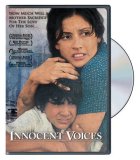Ilankai Tamil Sangam30th Year on the Web Association of Tamils of Sri Lanka in the USA |
|||
 Home Home Archives Archives |
Innocent Voicesby Volker Poelzl, Transitions Abroad, July 2008
Although the movie has received much attention because it deals with child soldiers, it is much more than a political vehicle for Human Rights groups. It is a skillful characterization of a family and its daily struggles during a time of war. Despite frequent scenes of violence, much time is spent on the characters and their interactions, making it not only a movie about child soldiers but also a well-told story involving the main characters, their lives, and loves. The movie follows the daily lives of Chava, his friends and family, and reveals how everyone is affected by the war they neither wanted nor are responsible for. His family’s situation worsens when his dad leaves for the USA. As Chava puts it: “One day my dad left us and went to the United States in the middle of the war. My mom didn’t say good-bye to him. She said to me that now I was the man of the house. But first I had to pee.” In addition to gunfights at night, the village boys are threatened by recruitment patrols that even come to the school to take away twelve-year-old boys to enlist them in the army. “We all are afraid of turning twelve years old,” Chava narrates, “because that’s when the army takes you. I had one year left.” But between nightly gunfights and daily recruitment drives by the army, Chava and his friends find time to play and just be children. This is one of the strong points of the movie: it succeeds in maintaining a child’s point of view of the war and shows both the horror and the little pleasures the boys experience, adding a touch of humanity and compassion. When his mother quits her job at a sewing factory and starts working out of her home, Chava remarks: “Since mom started working at home, the war didn’t seem so big.” Although not overtly critical, the movie infuses several references of U.S. involvement in El Salvador’s civil war, where the United States government sent troops to train the Salvadorean army and over one billion dollars in military support. After American soldiers who pass through the village hand out gum to Chava and his friends, an old market woman tells the boy: “Spit out that gum!” “Why? It’s yummy!” “Because the men who gave you that gum are training our soldiers to kill us. Not so yummy anymore, is it?” Mexican director and the movie’s co-producer Luis Mandoki is better known for his Hollywood movies such as "When a Man Loves a Woman" (1994) and "Message in a Bottle" (1999), but in ‘Innocent Voices’ he takes on the difficult topic of El Salvador’s civil war and its effect on children. In an interview available on the movie’s website he gives this statement: “For me the legacy of this film is for children. I think, every child that watches this film changes, and will walk a different way. A lot of children that have seen the film tell me, 'I just didn’t realize that that is what war is like.' Because for them, for most children in the world today, war is a game, so they like it. And this movie, because they connect to this boy, they realize it kills you. Making a movie about a true story and what that demands, the legacy for me is truth.” The movie only had a limited commercial release in the U.S., but it was shown at film festivals around the world and won several awards. It was the official submission from Mexico for the 2004 Academy Awards. To find out more about the movie, visit www.innocentvoicesmovie.com. |
||
|
|||
 There are very few movies about Central America, except for “shoot ‘em up” action flicks from the U.S. “Innocent Voices” is a notable exception. It is one of very few movies about Central America that take an honest look at the region’s social, cultural, and political reality of the recent past. “Innocent Voices” is a compelling drama about the brutal civil war in El Salvador during the 1980s. It is based on the childhood experiences of Oscar Torres, who co-wrote the script. The movie tells the story of eleven year-old Chava (Carlos Padilla), a boy who lives in a small village in El Salvador with his mother (played by Chilean actress Leonor Varela) and his siblings. Since the village lies between the capital controlled by the Salvadorean army and the area controlled by the peasant guerilla fighters, it suffers frequent raids and attacks from both sides.
There are very few movies about Central America, except for “shoot ‘em up” action flicks from the U.S. “Innocent Voices” is a notable exception. It is one of very few movies about Central America that take an honest look at the region’s social, cultural, and political reality of the recent past. “Innocent Voices” is a compelling drama about the brutal civil war in El Salvador during the 1980s. It is based on the childhood experiences of Oscar Torres, who co-wrote the script. The movie tells the story of eleven year-old Chava (Carlos Padilla), a boy who lives in a small village in El Salvador with his mother (played by Chilean actress Leonor Varela) and his siblings. Since the village lies between the capital controlled by the Salvadorean army and the area controlled by the peasant guerilla fighters, it suffers frequent raids and attacks from both sides.